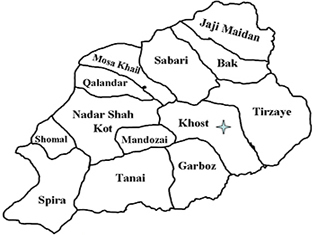One hundred Pushtun guerrillas launched a major offensive in an attempt to take Spera District center. They drew down on themselves the full fury of US and NATO air forces that gave support to Afghan National Police, which killed up to 70 of them.
Jang reports in Urdu that Khost governor Arsala Jamal said that the guerrillas had begun by attacking police checkpoints. In the aftermath, local police asked for help from the Afghan army.
Kabul Pajhwok Afghan News says that Afghan National Police and ISAF (NATO) units surrounded the guerrillas, calling in air strikes and helicopter gunships. When guerrillas ran into a building to take cover, helicopters destroyed it with missiles. The fighting went on into the early hours of Sunday. A “small number” of ANP officers were killed.
There is a discrepancy here with Jang, which said that it was the Afghan army, not ANP, that riposted, and said that Afghan aircraft were flown in the counter-attack.
This incident was a sign of bad guerrilla tactics on the part of the Pushtun guerrillas. You can’t launch conventional attacks and try to take and hold territory when your enemy is extremely powerful and controls the air. On the other hand, it is not a good sign that the Afghan police in the area could not fight off 100 guys by themselves.
The attack on Spera comes just a week after guerrillas took Arjistan, 150 mi. south of the capital of Kabul, from which US & NATO & Afghan forces dislodged them on Wednesday.
There was also a suicide bombing at Khost.
This news underlines Barack Obama’s comments on Sunday, in AP’s words: “In his first public appearance since returning to the United States, Barack Obama says Afghanistan’s weak government and rampant drug trafficking are hampering efforts to fight al-Qaida terrorists who often take refuge in neighboring Pakistan.”
Barnett Rubin is blogging up a storm on Afghanistan, and the prickly issues of narco-terrorism and how to fight it. He is skeptical of the meme that the tactics used in Colombia were a complete success. I hope everyone in the blogosphere is aware of how extraordinarily fortune we are to have direct access to the thinking of perhaps the foremost Afghanistan expert.
The problems in far southern Afghanistan are related to the increased organizational capacity of Baitullah Mahsud’s Tehrik-i Taliban, which is a misnomer because a lot of his fighters appear just to be tribesmen, not seminarians (which is what “Taliban” means).
Some of the restiveness of the Pushtun tribes of the Pakistani Federally Administered Tribal Areas (FATA) derives from a growing wheat shortage.
On Saturday, Edak tribesmen blocked the Bannu-Miranshah road in FATA, protesting the lack of flour. The American public should be alarmed to hear that like 15 percent of Pakistanis blame the US for their wheat shortage.
Meanwhile, The Pakistani government took back on Sunday an announcement made Saturday that Inter-Services Intelligence, Pakistani military intelligence, had been put under the control of the civilian ministry of the interior. A clarification today said that the feared ISI, which is accused of using the neo-Taliban against Afghanistan, remains under the authority of the prime minister. That restatement might imply in turn that it remains under the control of the military, who supposedly report to the PM but actually dictate military policy to him.





 © 2025 All Rights Reserved
© 2025 All Rights Reserved